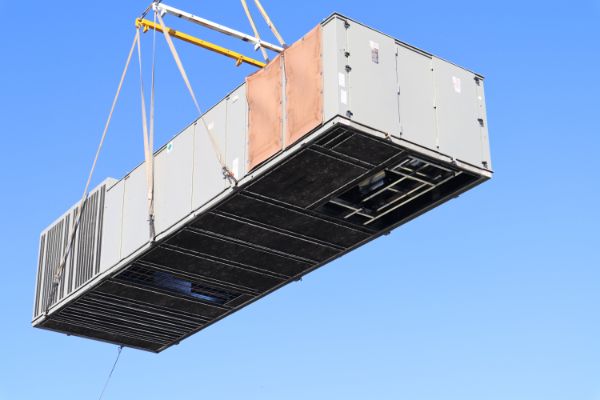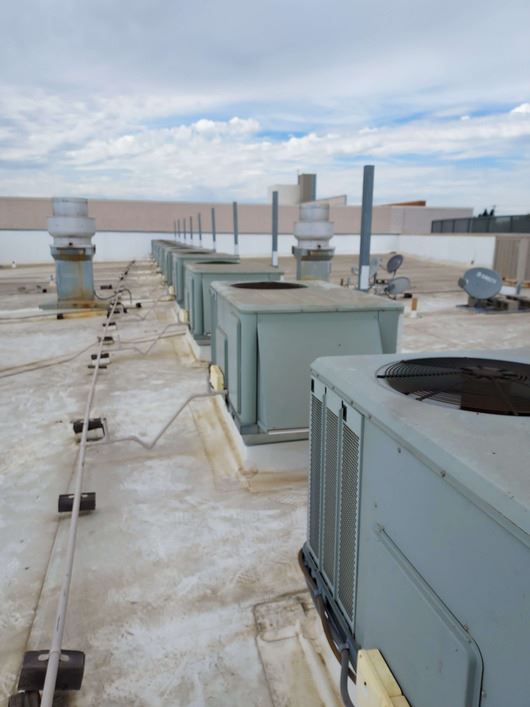A replacement guide by Cooper Oates, a Sacramento commercial mechanical contractor with over 50 years of HVAC experience
If you are a building owner or property manager, you’ve most likely dealt with sub-par heating or cooling performance from your HVAC unit, affecting the comfort of your tenants.
Maybe you’ve noticed the energy bills going up, complaints of “too hot” or “too cold”, or you’d like to be prepared for future mechanical costs while you maintain the health of your system. There are over 10 million rooftop units in the United States alone, and many are 15+ years old- often desperate for an upgrade or replacement!
With a new HVAC system being one of the most important investments you can make for your building, it’s essential to correctly determine whether you should hang on to your old unit or go with a full replacement for the betterment of your business.
Here Are 6 Key Indicators to Determine Whether it's Time for an HVAC Replacement
1. Age of Your HVAC System:
The age of your HVAC system is one of the most critical factors to consider. According to ASHRAE (American Society of Heating, Refrigerating and Air Conditioning Engineers) most HVAC systems average a lifespan of around 15-18 years (give or take), depending on various factors such as maintenance, usage, and quality of installation. If your unit is going on 10-15 years of age, you’re most likely noticing increased issues and decreased performance. A decrease in performance at this age may mean it’s time to start thinking and budgeting about a total replacement.
On the other hand, with a newer unit with an age under ten 10 years, you have a great opportunity to start a comprehensive preventative maintenance contract with a commercial HVAC contractor like Cooper Oates to stay on top of potential repairs needed, rather than fully replacing. This can help alleviate some of the issues you may be experiencing as there is still hope for your system to be improved and extend its life span.
2. Energy Efficiency:
Older HVAC systems tend to be less energy-efficient than newer models. SEER and EER ratings, used to indicate the overall energy efficiency of an HVAC system, could be a good indicator. If you've noticed a significant increase in the energy bills or if your system has a low SEER (Seasonal Energy Efficiency Ratio) rating, it might be more cost-effective in the long run to invest in a new, energy-efficient HVAC system.
Newer models have the potential to not only reduce your carbon footprint but also save you money on the monthly energy expense- win-win! Cooper Oates, an HVAC contractor in Sacramento, can help you find the best-fit solution for your building to lower long-term expenses. Our energy experts at Cooper Oates are one phone call away.
3. Repair Frequency and Cost:
Are you constantly calling for repairs for your HVAC system? As HVAC systems age, they become more prone to breakdowns, and the cost of repairs can quickly add up to thousands of dollars. If you find yourself spending a significant amount on repairs or if your system requires frequent repairs, it may be more economical to replace it altogether. A total replacement could save your business money in the long run. The repair costs will dissipate and the new equipment will be under warranty for several years.
4. Performance Issues & Indoor Comfort:
Are certain rooms in your building consistently too hot or too cold? Do you experience uneven airflow or poor indoor air quality? These comfort and performance issues could indicate that your HVAC system is struggling to keep up with demand or that it's not functioning as efficiently as it should. A new HVAC system can address these issues and provide better comfort and air quality for occupants. Tenant retention is crucial to the health of your business.
5. Weird Noises or Odor:
Fibers coming out of the vents or strange noises such as banging, clanking, or squealing coming from your HVAC system are often a sign of underlying issues. Similarly, if you notice musty, “burning” or foul odors coming from your vents, it could indicate mold or other contaminants within the system, or could signal a broken system.
These issues not only affect the performance of your HVAC system but also pose health risks to the occupants. If you encounter unusual noises or odors, it's essential to have your system inspected by a professional and consider replacement if necessary.
Expert help is only a phone call away to speak to one of our HVAC experts at Cooper Oates.
6. Technological Advances:
HVAC technology has come a long way in recent years, with advancements such as smart thermostats, variable-speed motors, and zoned heating and cooling systems. If your system is old or failing, investing in a new HVAC system allows you to take advantage of these technological innovations, leading to greater comfort, energy savings, remote visibility (fewer service calls) and convenience.
Conclusion
Replacing your HVAC system is a significant investment, but it's one that can pay off in terms of improved comfort, energy efficiency, and indoor air quality. Replacing the HVAC equipment will also increase the value of your building.
By considering factors such as the age of the system, energy efficiency, repair frequency and cost, comfort and performance issues, strange noises and odors, technological advancements, and environmental considerations, you can make an informed decision about whether it's time to replace your HVAC system.
If you decide to fully replace your HVAC system, it’s imperative to put your building in the hands of a trusted and experienced mechanical contractor like Cooper Oates who has your best interest in mind. As your service provider, we would make it a priority to fully assess your system to make the best decision for you in terms of comfort and cost.
Trust Cooper Oates for Your Commercial HVAC Replacement
Cooper Oates is a full-service mechanical contractor based in Sacramento, CA with extensive experience with commercial HVAC repair, retrofits and replacements in every type of commercial building.
Let Cooper Oates resolve your facility’s comfort issues to increase the return on your building investment. We’ll make sure your best interest is in mind when determining the optimal choice for your HVAC system. Contact us today.

